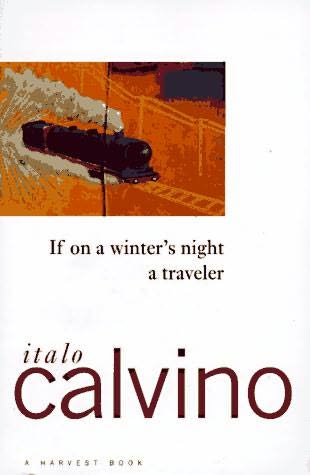After reading the beginning of Italo Calvino's If on a winter's night a traveler, I find the work to have an interesting premise. It is funny, because in another class I am currently taking called "Evaluating Literature", we attempt to determine what comprises good fiction. In this class, the professor said that he utterly detests when the author interrupts the narrative to draw attention toward himself. By the author making himself known as a fiction shaper, the reader is thrown back to reality and is unable to stay in the escapist, fantastic vision that fiction supposedly supplies to readers. However, I feel that Italo Calvino's vision is not just to interrupt a fiction plot by inserting a reminder that the author is there. Instead, Calvino breaks down the entire experience of reading itself and because his fragmented, deconstructed vision is so prominent, I think it works. I can't say that I was completely enthralled in the novel. I found myself less directly magnetized to the story, but nonetheless, the first few chapters were really quite a unique experience. I like how Calvino addresses the reader; it is very intimate, reminding me of a Holden Caulfield-like narration. I love the quote where Calvino says, "You're the sort of person who, on principle, no longer expects anyhting of anything...You know that the best you can expect is to avoid the worst. What about books?...you may still grant yourself legitimately this youthful pleasure of expectation in a carefully circumscribed area like the field of books...but the risk of disappointment isn't serious" (Calvino, 4). I also found the author to be humorous, such as his categorization of books that get overlooked when a reader is purchasing a new work. I am still having trouble getting using to Calvino's actual fiction stories, because they are not conventionally how I read novels. Because Calvino makes his presence known even in the plot-driven, fiction segments, I feel that his writing is more closed text (Roland Barthes' privleging of the author's intent), where he is directing the reader on how to interpret and work within the confines. It seems ironic so far -- that the actual fiction seems more closed text than open and yet Calvino is describing how the reader interprets and treats an author's work in front of him. Another quote I really liked was, "...or perhaps already I had been trying to wring from the past of that unknown me a secret to add to my past or to my future..." (Calvino, 39).
QUESTIONS
1) Does Calvino impress his vision/intentions on the reader so heavily that there is little for interpretation? Or does the reader still have control?
2) Does dragging a suitcase have symbolic meaning, beyond the literal?
3)What kind of works did Calvino write before this?
The blog for SUNY Binghamton's Spring'09 COLI 214B 02 Literature and Society Class. Chapter summaries, analyses and discussion of prescribed texts written by students.
Thursday, February 26, 2009
Subscribe to:
Post Comments (Atom)






No comments:
Post a Comment